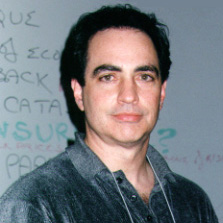Neil Jacobstein, B.S. (Summa cum Laude), M.S.
Neil Jacobstein, B.S. (Summa cum Laude), M.S. is coauthor of the Foresight Guidelines for Nanotechnology Development, which assert that self-replicating molecular nanotechnology: 1) is theoretically feasible in spite of recent pronouncements otherwise, 2) may take decades to develop, 3) will eventually have significant social and economic benefits as well as risks, and 4) should be pursued responsibly with appropriate controls and built-in safeguards.
Neil has been Chairman of the Institute for Molecular Manufacturing (IMM) since 1992. IMM is a nonprofit 501c3 molecular nanotechnology research group focused on the long-term feasibility, embedded safeguards, and future applications of molecular manufacturing. He has briefed the White House Office of Science and Technology Policy, the Churchill Club, the Foresight Institute, the CleanTech Venture Forum, the Draper Fisher Jurvetson Conference on Nanotechnology, Levensohn Venture Partners, a nanotechnology panel sponsored by The Economist and the CATO Institute, the 2005 U.S. National Academy of Sciences Workshop on the feasibility of Molecular Manufacturing, and the Office of Naval Research’s Naval S&T Partners Conference 2006.
He is Chairman and CEO of Teknowledge Corporation, a knowledge systems software company in Palo Alto that was founded in 1981. He has been a technical consultant on interdisciplinary research and development projects for: NSF, DARPA, NASA, NIH, EPA, DOE, NRO, the U.S. Army and Air Force, NIST, GM, Ford, P&G, Boeing, Applied Materials, and many financial institutions. He chaired the American Association for Artificial Intelligence’s 17th Innovative Applications of Artificial Intelligence conference in 2005. He gave an invited talk at the 2006 IAAI conference on: Electrifying Knowledge Work: 362 Innovative Applications of Artificial Intelligence 1989–2006.
In 1999, Neil was selected as an Aspen Institute Henry Crown Fellow. He has created and moderated seven Socrates Seminars at the Aspen Institute on the opportunities and risks of future technologies. He was a Senior Research Fellow in Stanford University’s Digital Vision Program 2006–2007, and gave a popular Robust Futures workshop there. He earned his BS in Environmental Sciences, Summa cum Laude from the University of Wisconsin, and an MS in Human Ecology from the University of Texas, in conjunction with NASA’s Environmental Physiology Simulation Program at the Johnson Space Center in Houston.
He was a Graduate Research Intern in the Learning Research Group at Xerox Palo Alto Research Center, and a consultant in PARC’s Software Concepts Group. He spent four years as a Research Associate with the Center for the Biology of Natural Systems doing environmental and renewable energy research. He has served on the Technology Advisory Board for the U.S. Army’s Simulation, Training, and Instrumentation Command, and a variety of other advisory boards. He is a coinventor of U.S. Patent #6,029,175 Automatic Retrieval of Changed Files by a Network Software Agent that has been licensed to several of the world’s largest software companies.
